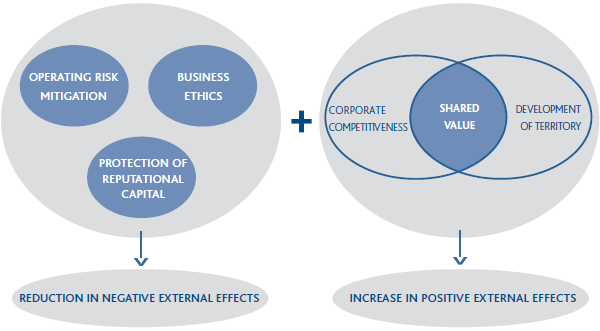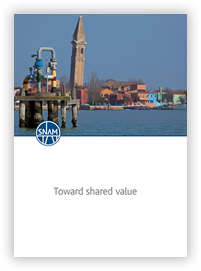The previous edition of the Sustainability Report included some points for reflection in connection with dialoguing with stakeholders on evaluating the shared value that the Company already produces through its practices and know-how, and how it may be articulated. This means starting an approach within a process of continual improvement to combine interpreting sustainability from a “value protection” standpoint, i.e. mitigating operational and reputational risks, with an approach geared more toward “value creation,” as a driver of innovation, with express reference to the concept of “shared value creation” theorised by Michael Porter and Mark Kramer.
With this reflection as a starting point, a project was begun in late 2011 aimed at a more in-depth methodological understanding of the concept of shared value and at evaluating its applicability at Snam. In the early months of 2012, specific internal meetings were organised to share the project, which led to identifying different possible current projects and potential new initiatives.
This project is on a path of natural continuity with the sustainability initiatives implemented in the last two-year period, starting with the mapping of stakeholders and the engagement projects deriving from it, including the Social Impact Assessment, the Suppliers Day Sustainability, the same engagement strategy with non-profit organisations and still others that are described in this Report.
The shared value project and its main conclusions are stated in the document “Toward shared value” that accompanies the 2011 Sustainability Report.
“Creating Shared Value”, by Michael E. Porter
and Mark R. Kramer
The shared value approach, conceived by Michael Porter, a professor at Harvard Business School where he heads up the Institute for Strategy and Competitiveness, in collaboration with Mark Kramer, senior fellow of the CSR Initiative at Harvard’s John F. Kennedy School of Government in Cambridge, Massachusetts, explores the link between the economic system and society. The concept, published for the first time by the Harvard Business Review in January 2011, is based on the assumption that, in light of the recent financial and economic crises, capitalism is under attack and therefore it is necessary to identify a new model capable of reinventing it.
The starting point is that no company is an isolated entity. The success of all companies is influenced by the support services and infrastructure surrounding them; productivity and innovation are strongly influenced by the logistical infrastructure of a given local area. Players operating in a local area can create conditions for a context favourable to business development. On the other hand, a healthy social and local context depends on the presence of companies that are capable of providing jobs, offering adequate salaries and wages, acquiring quality goods and services, paying taxes, protecting the environment, using resources efficiently, etc.
Companies, says Porter, must act to reconcile business and society, and the path to go down is that of “creating shared value”, i.e. creating economic value in such a manner as to generate value at the same time not only for the Company, but also for society, simultaneously meeting the Company’s needs and needs of a social nature. It is a new point of view that involves making the most of company know-how and reconfiguring relations throughout the value chain.
The concept of shared value in a certain sense includes the idea of social responsibility applied until now: it serves as an innovative approach to sustainability that sees social growth as a central and not an ancillary objective, write the authors. “CSR programmes focus mainly on reputation and have only a limited connection to business, which makes them difficult to justify and maintain over the long term. On the other hand, the Creation of Shared Value (CSV) is functional to profitability and to a company’s competitive position. It makes use of a company’s specific resources and specific expertise to create economic value through the creation of social value”.
SUSTAINABILITY 2.0


The subject of shared value is not intended to replace the sustainability measures in existence at the Company, but to support and enhance that aspect, from a standpoint of continuity and consistency with what is already in place. In an attempt to follow this approach in its operations, Snam has made a summary interpretative model, which has allowed the group to review its core and support processes from the standpoint of shared value.



